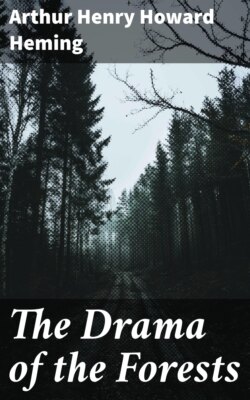Читать книгу The Drama of the Forests - Arthur Henry Howard Heming - Страница 9
На сайте Литреса книга снята с продажи.
A MIGHTY HUNTER
ОглавлениеTable of Contents
After the two traders had finished "talking musquash"—fur-trade business—they began reminiscing on the more picturesque side of their work, and as I had come to spend the winter with the fur hunters on their hunting grounds, the subject naturally turned to that well-worn topic, the famous Nimrods of the North. It brought forth many an interesting tale, for both my companions were well versed in such lore, and in order to keep up my end I quoted from Warren's book on the Ojibways: "As an illustration of the kind and abundance of animals which then covered the country, it is stated that an Ojibway hunter named No-Ka, the grandfather of Chief White Fisher, killed in one day's hunt, starting from the mouth of Crow Wing River, sixteen elk, four buffalo, five deer, three bear, one lynx, and one porcupine. There was a trader wintering at the time at Crow Wing, and for his winter's supply of meat, No-Ka presented him with the fruits of his day's hunt."
My host granted that that was the biggest day's bag he had ever heard of, and Trader Spear, withdrawing his pipe from his mouth, remarked:[Pg 7]
"No-Ka must have been a great hunter. I would like to have had his trade. But, nevertheless, I have heard of an Indian who might have been a match for him. He, too, was an Ojibway, and his name was Narphim. He lived somewhere out in the Peace River country, and I've heard it stated that he killed, in his lifetime, more than eighty thousand living things. Some bag for one hunter."
Since Trader Spear made that interesting remark I have had the pleasure of meeting a factor of the Hudson's Bay Company who knew Narphim from boyhood, and who was a personal friend of his, and who was actually in charge of a number of posts at which the Indian traded. Owing to their friendship for one another, the Factor took such a personal pride in the fame the hunter won, that he compiled, from the books of the Hudson's Bay Company, a complete record of all the fur-bearing animals the Indian killed between the time he began to trade as a hunter at the age of eleven, until his hunting days were ended. Furthermore, in discussing the subject with Narphim they together compiled an approximate list of the number of fish, wild fowl, and rabbits that the hunter must have secured each season, and thus Narphim's record stands as the following figures show. I would tell you the Factor's name but as he has written to me: "For many cogent reasons it is desirable that my name be not mentioned officially in your book," I must refrain. I shall, however, give you the history of Narphim in the Factor's own words:
"Narphim's proper name remains unknown as he was one of two children saved when a band of Ojibways were drowned in crossing a large lake that lies S. E. of Cat Lake and Island Lake, and S. E. of Norway House. He was called Narphim—Saved from the Waters. The other child that was rescued was a girl and she was called Neseemis—Our Little Sister. At first Narphim was adopted and lived with a Swampy Cree chief, the celebrated Keteche-ka-paness, who[Pg 8] was a great medicine man. When Narphim grew to be eleven years old he became a hunter, and first traded his catch at Island Lake; then as the years went by, at Oxford House; then at Norway House, then at Fort Chepewyan, and then at Fort McMurray. After that he went to Lesser Slave Lake, then on to the Peace River at Dunvegan, then he showed up at Fort St. John, next at Battle River, and finally at Vermilion.
"The following is a list of the number of creatures Narphim killed, but of course he also killed a good deal of game that was never recorded in the Company's books, especially those animals whose skins were used for the clothing of the hunter's family.
"Bears 585, beaver 1,080, ermines 130, fishers 195, red foxes 362, cross foxes 78, silver and black foxes 6, lynxes 418, martens 1,078, minks 384, muskrats 900, porcupines 19, otters 194, wolves 112, wolverines 24, wood buffaloes 99, moose 396, caribou 196, jumping deer 72, wapiti 156, mountain sheep 60, mountain goats 29; and rabbits, approximately 8,000, wild fowl, approximately 23,800, and fish approximately 36,000. Total 74,573.
"Yes, Narphim was a great hunter and a good man," says the Factor in his last letter to me. "He was a fine, active, well-built Indian and a reliable and pleasant companion. In fact, he was one of Nature's gentlemen, whom we shall be, and well may be, proud to meet in the Great Beyond, known as the Happy Hunting Grounds."
Thus the evening drifted by. While the names of several of the best hunters had been mentioned as suitable men for me to accompany on their hunting trail, it was suggested that as the men themselves would probably visit the Post in the morning, I should have a chat with them before making my selection. Both Mackenzie and Spear, however, seemed much in favour of my going with an Indian called Oo-koo-hoo.[Pg 9] Presently the clock struck ten and we turned in, the Free Trader sharing a big feather bed with me.
